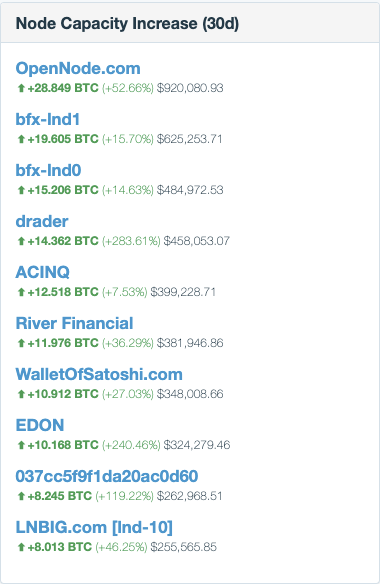- July 17, 2021
- Posted by: admin
- Category: BitCoin, Blockchain, Cryptocurrency, Investments
The Bitcoin second layer payment protocol Lightning Network has been exponentially increasing its capacity during the past years. Since it was launched in 2018, the network’s capacity has gone from under 1,000 BTC to 1,800 BTC.
The Lightning Network was first proposed in 2015 and operates with payment channels to allow users to send and receive faster and cheaper transactions than on Bitcoin’s base layer. These transactions are processed “off-chain” by lightning nodes.
2021 has been Bitcoin Lightning Network’s most important year in terms of growth. As Arcane Research noted, over 800 BTC has been added to its capacity since January this year alone.
More accurately, it took 39 days for the Lightning Network to go from 1,100 to 1,200 BTC and 5 days to go from 1,700 to 1,800. This data suggest that there is high demand for

Ryan Gentry, part of the Business Development department at Lightning Labs, believes the recent growth comes from 4 mains sources.
First, three companies, Umbrel, RaspiBlitz, and Voltage have joined forces to produce educational material related to the Lightning Network. Created by developers Leo Weese and Hannah Rosenberg, these guides have “made it stupidly easy to get a (Lightning Network) node online and connected”, Gentry said.
The Builder’s Guide touches crucial topics, such as Network Topology, channels lifecycle, payment lifecycle, invoices, routing it responds Frequently Ask Questions (FAQ), and much more.
Thus, people have access to the basic tools to set up their own nodes and have contributed to the expansion of communities build around this Bitcoin-based payment solution. Gentry said:
This laid the groundwork for some super vibrant communities of node runners to pop up a la Ring of Fire and Plebnet. These groups are the primordial soup out of which the next wave of LN startups will emerge IMO…
The Lightning Network Expands Bitcoin Peer-To-Peer Potential
In addition, the increase in volume made by the Lightning Network has attracted a “large influx of capital”. In the past month, according to data shared by Gentry, the most popular nodes have received over $4 million in BTC.

In addition, Gentry believes that the Bitcoin Law approved by El Salvador has proven that the Lightning Network can be used to “cross the chasm”.
In other words, to drive BTC adoption to the mainstream and close the gap between early adopters and the early majority of users. Remittances can be the perfect use case to achieve this objective.
Finally, Gentry argues that more companies are realizing that the Bitcoin Lightning Network can facilitate the monetization of liquidity, storage, bandwidth, and compute. These resources will be offered in a marketplace in the future. Gentry added:
One thing people will catch onto next is how the Lightning Network is also the best solution to the bidder accountability problem that has plagued software auctions for decades.
At the time of writing, Bitcoin trades at $31,767 with sideways movement in the daily chart. BTC sits at critical support and an ongoing battle between bears and bulls has been taking place recently.
Its outcome could determine BTC’s price future, at least, for the coming weeks.
